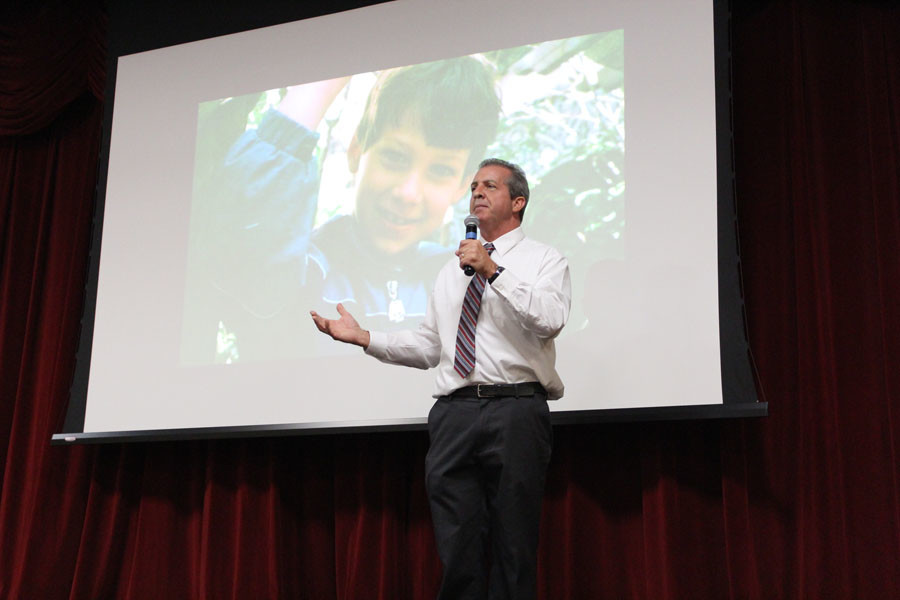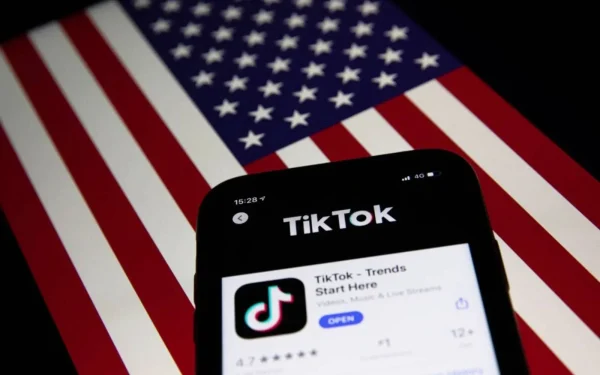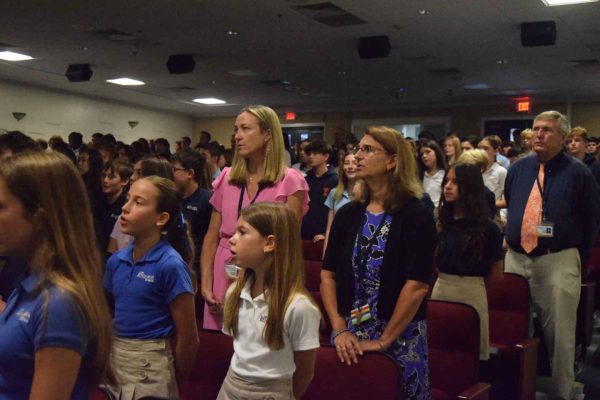John Halligan Presents “Ryan’s Story”
Father shares the pain and grief he felt after his son, Ryan, committed suicide as a result of cyberbullying
Mr. John Halligan answers student questions after his presentation. A picture of Ryan Halligan appears on the screen behind him.
What is bullying to you? Some people may perceive bullying as the big kid who attacks everyone. These days, there’s a new, inescapable bully – cyberbullying on the world wide web.
The world wide web (you know, that “www” prefix you type into your browser when you’re trying to get to a website?), also known as the Internet, was created in 1989 by Tim Berners-Lee. Used for sharing and archiving information, organizing personal data, conducting business and commerce, and connecting with friends and family, the Internet is an extremely powerful resources that is difficult to imagine not having at one’s disposal. And the world wide web is just that – world wide! With people connecting more and more closely via an endless list of social media sites, such as Facebook and Instagram, people across the globe now have useful, simple ways to stay in contact. However, the Internet can also be used for nefarious purposes as these sites can be quite misused. So misused that they can become perfect pathways for cyberbullies.
What exactly is cyberbullying? Defined by the National Crime Prevention Council, it is when “…the Internet, cell phones or other devices are used to send or post text or images intended to hurt or embarrass another person.” With technology being so ubiquitous and easy to use these days, cyberbullying can be as simple as creating a fake username to hurt others.
On September 15, 2015 John Halligan came to The Benjamin Middle School and spoke to students in grades five through eight on the pressing, too-real effects of bullying and cyberbullying for him and his family. Mr. Halligan opened the assembly by showing a photo and video montage of his son Ryan put to the music of Elton John’s “The Last Song.” Mr. Halligan then detailed the events leading up to his son’s death.
Ryan Halligan was born in December 1989. Early on, Ryan was diagnosed with early learning and development issues, but by the fifth grade, he was able to transition from special needs to regular classes. Once Ryan was out of special education and caught up to his friends at school, he still struggled to keep his grades up. From fifth through eighth grade, Ryan was bullied because of his academic and athletic struggles, at first by just one person, but then it grew to include several people. He was being bullied in person at school and online at home.
Especially during his middle school years, instant messaging was gaining mass popularity, just as social media is continuing to now. As Mr. Halligan pointed out, his generation didn’t have to deal with bullying at home, because there was no Internet. “In previous years, bullying was all about fighting, but with technology and the Internet, the words have the ability to never stop,” added Dead on Students Mr. Jeffrey Cavallo, who orchestrated Mr. Halligan’s speaking engagement at TBS.
Summer used to be a break from the teasing, but Ryan’s summer going into his eighth-grade year was affected by rumors and fake friendships. He suffered from chronic bullying and depression which he kept from his parents. As a result, the teasing and bullying had unseen effects.
On October 7, 2003, Ryan Halligan committed suicide at the age of 13. Because Mr. Halligan knew the password to Ryan’s instant messaging account, he was able to access Ryan’s chat history. He then found what Ryan had been hiding from him – the constant cyber bullying to which Ryan had been subjected.. Online and offline bullying had “…blown up a bomb in the middle of [Ryan’s] family and [we] would never be the same,” explained Mr. Halligan.
The assembly was an emotional one which brought both students and faculty to tears. However, Mr. Halligan noted that his intent was not to upset those in attendance, but to warn them of the dangers of bullying and cyberbullying so that no family has to endure what his did in losing Ryan. His goal is to encourage kids to “not be a bystander, [but] an upstander – stand up against bullying.”
“The assembly was very sad and I believe it was something [The Benjamin Middle School] really needed to hear,” said eighth grader Ashely Cousin. “Cyberbullying is an issue.”
However, some students feel that the constant lectures about bullying and appropriate online behavior are redundant.“These presentations are important,” said eighth grader Nicole Fields, “although they have become repetitive.”
The administration, though, believes it’s important for students to continue to hear such real-life, emotional messages.
“The presentation was about humanity,” stated Head of Middle School Mr. Charles Hagy. “It was also about the biggest lessons in life, not being afraid to take care of one another.” That’s the message the administration wants the students to hear. If everyone tries to be an upstander, the large-scale bullying problem here in America and abroad would not persist.





